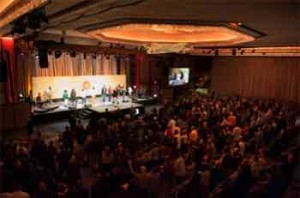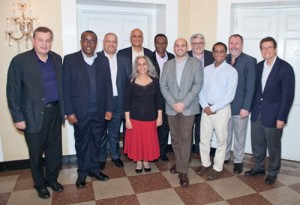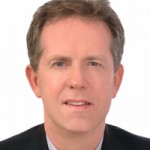In the fall of 2009 our team received the research results on Manhattan church planting. The New York City Leadership Center[1] and Redeemer City to City had co-commissioned the research to determine the growth of Christianity in Manhattan. We were stunned by the results.
The research indicated that Christianity had grown from 1% to 3% of the population in Manhattan during the years 1989-2009. Of the churches surveyed, 39% had been started within the past decade.[2] God was moving sovereignly to bring church planters to New York City. Our collaboration with Redeemer City to City provided assessment, training, and start-up grants for new church plants affiliated through our joint initiative, the Church Multiplication Alliance (CMA), established in 2003.
The decision was made as the result of that research to launch the issues-focused Movement Day conference in September 2010. We had our first gathering for 800 city leaders from 34 states and 14 countries. God was stirring in the hearts of leaders to learn from one another and to share best practices.
The gospel grows in Manhattan

Manhattan is arguably the most influential island in human history. Modern-day Manhattan is a hub of global influence for media, politics, art, fashion, and finance. During the 1970s and 1980s, Manhattan (along with all of New York City) journeyed through a series of crises. When my wife Marya and I arrived in 1984, the city was broke, violent, and severely under-churched.
Six months after we arrived in New York City, Bernard Goetz, a Caucasian, shot five unarmed African-Americans on a subway. That unleashed a decade of violence that culminated in 1994 with 2,400 murders in New York City. We experienced eight murders a day in what became known as the murder capital of America. Yet God was on the move …
Two spiritual movements began simultaneously in the late 1980s in New York City:
- I became involved in the incubation of a prayer movement, which brought thousands of leaders and hundreds of churches together in united prayer. We experienced the incredible panorama of the international church of New York City coming together in Pastors’ Prayer Summits, National Days of Prayer, and a daily prayer vigil.
- The second movement was a church planting movement that began with Dr Tim Keller establishing Redeemer Presbyterian Church in Manhattan. Within a few years Redeemer was planting daughter churches. By 2003, Keller and I had begun to collaborate on the CMA with ten denominations involved. The CMA provided prayer support, coaching, and shared resources to affiliated church planters.
The 2009 research gave evidence to what was happening, with new churches attracting new people across Manhattan and the other boroughs.
Five years later in 2014, the research was updated to assess the progress and—to our surprise and delight—Christianity had grown to 5%.[3] The presence of the church was becoming palpable in Manhattan. Our prayer is that the church will reach 10% in the coming years—representing a ‘tipping point’ for the acceptance of gospel in the city.
Why this is important
The greatest demographic reality in human history is happening right now. Every hour there are 7,000 people moving into sizeable cities. A new San Francisco or Singapore is being birthed every month.[4]
One forecast predicts that the global population will grow by 20% in 20 years, to reach 8.3 billion people by 2030.[5] The majority of the people in the world today are urban, poor (living on less than $2 a day), and young (under 25 years of age).[6] Globally, 65% of the population lives in Asia, and Africa has the fastest growing population.[7] In Latin America, 50% of the population lives in Mexico and Brazil.[8] Sao Paulo, Mexico City, and Rio de Janeiro are three of the greatest cities on the planet.
Movement Day 2010-2015

Movement Day began as a one-day gathering to focus on three themes—the gospel, cities, and movement acceleration. Our convictions are simply: cities shape culture, gospel movements shape cities, and leaders catalyze movements.
What is a gospel movement? A gospel movement is taking place when Christianity is growing faster than the general population, measurable progress is being made against social issues (eg educational performance, foster care), and Christians are increasingly finding themselves in places of cultural influence.
Eight Movement Day gatherings have happened in the past five years including two gatherings in Dallas. More than 11,000 leaders have participated from 360 cities worldwide. The structure of Movement Day is simple:
- The morning and closing plenaries focus on worship, prayer, and vision casting to engage the city. In our New York City flagship event last year, our themes were crossing the spiritual, racial, economic, and generational divides in cities.
- The afternoon learning tracks are organized around specific needs of cities—church planting, prayer, marketplace engagement, urban universities, the poor—and many other topics. We want each track to answer three questions regarding these great needs: Where are we today (research)? Where do we want to be in ten years (vision)? How do we get there (strategy)?
In the past five years, six significant stories have emerged in NYC and Dallas:
- The growth of Christianity in Manhattan from 3% to 5% in five years.
- The launch of the City Serve event, led by the Luis Palau Association, after Movement Day 2012, which linked 1,700 churches in acts of community service.
- Pastoral partnerships in Dallas that have linked churches across racial lines.
- INITIATIVE: A millennial leader network of 2,000 young leaders in Dallas reaching out to their peers and investing in the church.
- Explore God: A campaign involving 400 Dallas churches completing a shared sermon series, billboards, community discussion groups, and social media to impact thousands of people.
- Re-entry: Marketplace leaders are providing life skills to persons re-entering Dallas from prison, providing them a chance of gaining employment.
Movement Day Global Cities 2016 (MDGC)

MDGC will take place in New York City on October 25-27, 2016, at the Jacob Javits Center, in collaboration with the Lausanne Movement. The vision for MDGC is to convene leaders from 100 cities globally to:
- see what God is doing in cities globally;
- connect the body of Christ in cities;
- change cities by applying best practices of urban mission; and commission each other in our respective callings.

At MDGC we will have world-class faculty from five continents speaking on the centrality and impact of cities. The morning sessions will be organized around these themes:
- The glory and challenges of cities
- Millennials: The future of city movements
- Partnership: The strategy to impact cities
The afternoons will be divided into a range of conversations such as: the arts in cities, the role of marketplace leaders, church planting, prayer and spiritual warfare, and the role of catalytic events in city movements.
On the final night there will be a commissioning service with leaders celebrating the globally diverse church in cities.
Conclusion
This past year I have been privileged to travel to London, Pretoria, Port au Prince, Mumbai, Chennai, Bangalore, Dubai, and Singapore. Though the contexts are very diverse, I am seeing some common themes in cities that we need to address together:
- Millennials are leaving the church everywhere: This is quite significant given that most spiritual movements are started by leaders under 28. Movement Day and urban mission are ways to meaningfully engage younger leaders.
- Social challenges are escalating rapidly: Whether it be the refugee crisis, human trafficking, or the global moral crises, cities are the places where this is all concentrated.
- City centers are radically under-churched: There is a huge need to pray for the identification and planting of effective churches in the great global cities.
- The body of Christ is divided: If division breeds atheism in the world, the unity of the church is a critical element in fostering the aroma of belief in cities globally.
Movement Day Global Cities is an opportunity to gather to worship, learn, strategize, and collaborate for the increased impact of the gospel in cities globally. We want to accelerate the impact of leaders in cities around today’s great challenges. We hope you will join us on October 25-27, 2016. Visit our website for all the latest details at www.MovementDay.com.
Endnotes
- The New York City Leadership Center (NYCLC) was founded by Dr Mac Pier, CEO, and is led by Dr Craig Sider, President, and Rev Ebony Small, Director of Movement Day & Events. The vision of NYCLC is to become a model of Christian leaders impacting the spiritual and social climate of an urban center. Our mission is to exponentially increase the leadership effectiveness of ministry and marketplace leaders. Visit our website at www.NYCLeadership.com.
- Tony Carnes, Manhattan Center City Evangelical Churches 2009, Values Research Institute 2009.
- Tony Carnes, Manhattan Center City 2014, Values Research Institute, 2014.
- Editor’s Note: See article entitled ‘Commitment to the Cities: Responding to The Cape Town Commitment on cities’ by Paul Hildreth in the March 2014 issue of Lausanne Global Analysis.
- Jason Mandryk, Operation World (Colorado Springs: Biblica Publishing, 2010), 1.
- Mac Pier, Consequential Leadership (Downers Grove: InterVarsity Press, 2012), 18.
- Mandryk, Operation World, 29, 57.
- Ibid, 46.

